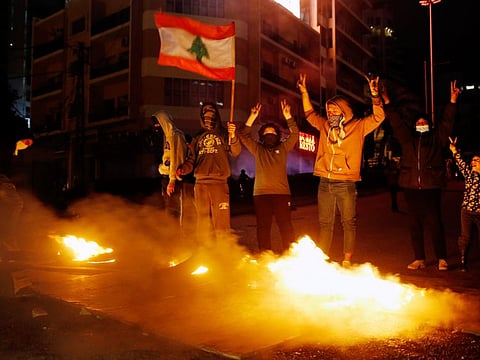Lebanon releases protesters, Amnesty slams ‘arbirtary arrests’
Hundreds of protesters massed outside of parliament on Thursday night

Also In This Package
Beirut: Lebanon’s security forces on Thursday released most of the 100-plus anti-government protesters detained in the past 48 hours, lawyers told AFP, after two nights of violent demonstrations in Beirut.
Protesters gathered in Beirut again on Thursday evening in front of the Central Bank and interior ministry, where several hundred demonstrators denounced police use of force and outgoing minister Raya al-Hassan.
A protest movement that has rocked Lebanon since October surged again from Tuesday, with a committee of lawyers defending demonstrators saying 101 people had been detained, including 56 on Wednesday, with five minors among them.
The lawyers’ committee announced on Facebook on Thursday that “all those arrested have been released with the exception of seven foreigners”.
The detained foreigners - six Syrians and an Egyptian - will be brought before authorities, the committee added.
Lebanese security forces announced 59 people were arrested on suspicion of vandalism and assault on Tuesday, when protesters angered by stringent informal capital controls attacked banks in central Beirut.
“Under popular pressure, the detained have been released two days after a hysterical crackdown,” Nizar Saghieh, who heads the Legal Agenda non-governmental organisation, wrote on Twitter.
Amnesty International denounced what it said were “arbitrary arrests”.
“What we have witnessed in the past couple of days is an alarming attack on freedom of assembly and expression,” said the watchdog’s Middle East research director Lynn Maalouf.
“Acts by a minority of protesters who vandalised banks or threw stones is never a justification for such excessive use of force and sweeping arrests by law enforcement.”
Fresh protests
On Thursday, near parliament, hundreds of protesters massed to denounce Lebanon’s ruling class and delays in forming a new independent government.
An unprecedented nationwide movement of protests demanding an end to endemic corruption and the wholesale removal of Lebanon’s political elite broke out nearly three months ago.
With little change in sight, protesters also angered by a financial crisis they blame on Lebanon’s oligarchs and the central bank resumed their rallies with renewed determination Tuesday after a holiday lull.
Protesters vandalised several banks on the central Hamra street on Tuesday evening and hurled rocks at anti-riot police, who responded with volleys of tear gas canisters.
Gathered in front of the Central Bank again on Wednesday, the protesters then moved to a police station where some of their comrades had been detained the previous night, leading to clashes that left dozens lightly wounded.
Outgoing prime minister Saad Hariri resigned under pressure from the street less than two weeks into the wave of protests, but a new government has still not been formed despite a stark and growing economic crisis.
On Thursday, Hariri met with Central Bank Governor Riad Salameh and caretaker finance minister Ali Hassan Khalil to discuss the financial crisis and upcoming debt maturities.
Lebanon is burdened with debts of almost $90 billion, or more than 150 percent of GDP.
Over the past few months, the Lebanese pound - long pegged to the US dollar at 1,507 - has slumped in value on the unofficial market to around 2,500.
After a long search for a suitable candidate, former education minister and university professor Hassan Diab was nominated as premier and tasked with picking a new cabinet.
Protesters have demanded a government of technocrats excluding the household names that have symbolised Lebanon’s sectarian-based politics for generations.
Local media reported a new cabinet could be named on Friday, after thorny government formation talks prolonged the process despite pressure from Lebanon’s foreign partners and donors.



